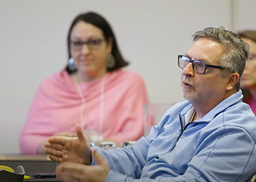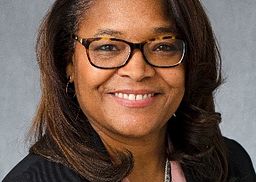Charles R. Drew’s David Ohnoki Becomes First PA Student Accepted into the Yale REACH Program

PAEA would like to congratulate David Ohnoki, PA student at the Charles R. Drew University of Medicine and Sciences (CDU) PA program, on being the first PA student ever to be accepted into the Yale REACH (Recognizing and Eliminating Disparities in Addiction through Culturally-informed Healthcare) Program.
REACH is a year-long training program designed to supplement the education of medical students, residents, fellows, and allied health professional trainees in ways to improve health outcomes for racial and ethnic underrepresented minority patients with substance use disorders. The goal of the program is to increase the overall number of racial and ethnic underrepresented minority (URM) addiction specialists in the Addiction Psychiatry and Addiction Medicine workforce and increase the number of addiction specialists adequately trained to work with racial and ethnic URM patients with substance use disorders.
Ohnoki, who serves as class president and volunteers his time as the student-led CDU Social Justice Society treasurer, said both his childhood and CDU experiences have given him a unique perspective and passion for the program. “My family is half Hispanic, half Japanese, and I had family members who struggled with alcoholism, opioid addiction, and heroin,” he said. “When you see that growing up, it’s always in the back of your mind. All of that, combined with the increasing opioid epidemic – which has hit underserved minority communities particularly hard – made me really passionate about this topic. Since Charles Drew is focuses on the South LA community, I want to be as ready as I can to serve the patients I will meet in my clinical year. If we’re going to be seeing this often, then I want to have the best tools in my toolkit.”
For Ohnoki, the most exciting part of the program is gaining invaluable knowledge that he can bring back to his community. “The first thing that I thought when I got into the program was, ‘What a great opportunity for me to learn and ultimately benefit the people that we’re serving,’” he reflected. “I’m excited for the opportunity to educate my future patients and the clinicians I will work alongside and be an advocate and agent of change in underserved populations. That’s what it’s all about. It feels bigger than me. When you have opportunities like this, it comes with the obligation to try and maximize the knowledge that you’re being given, because not everyone has that opportunity.”
Ohnoki said the fact that he is the first PA student to be accepted into the program is not lost on him. “I’m super happy and proud to be the first PA student to be accepted into the program, and coming from Charles Drew, an HBCU and Hispanic serving institution, brings me even more pride. I’m thankful for the PAs that have come before me, and I hope I live up to their expectations and represent them well. I’ll definitely do my best.”
Ohnoki believes that PAs play an important role in eliminating health disparities and bringing a vital voice to the broader health care conversation. “I think the important thing right now is to have more people on the front lines that can increase access to care for underserved communities,” he said. “I believe PAs can serve as a larger funnel for underserved patients at a primary care level, and then be gate openers to the remainder of patients’ care if they have specific needs. We have the power to connect and build trusting relationship with patients. With that comes the ability to disseminate information and spend a little bit more time on patient education, and I think those things are critical when we’re talking about treating addictions in underserved communities.”
Ohnoki’s vision for the future is focused on rebuilding patient-provider trust. “There is power in seeing a clinician that looks like you and talks like you,” he said. “That’s so important with addiction, because patients really have to feel that they have a provider they can rely on. My hope is that the PA profession will continue to grow more diverse and mirror the patient populations we serve in order to gain trust, guide, and work together with our patients.”
CDU leadership members and PAEA staff expressed pride and excitement on Ohnoki’s behalf. “This is a great opportunity for David, and I encourage other PA students to apply for this fellowship,” said CDU PA Program Director, Lucy Kibe, DrPH, PA-C. PAEA’s Chief of Policy and Government Relations, Dave Keahey, MSPH, PA-C commented “This is a great honor for Mr. Ohnoki and the Charles R. Drew PA Program. It complements the work that PAEA has been engaged in through our Medication Assisted Treatment Initiative, Opioid Response Network activities and the SAMHSA-funded PRAC-ED-PA SUD Curriculum Grant. We wish him great success during his time in the Yale REACH fellowship and will draw upon his growing expertise and leadership in the treatment of patients with SUDs.”









